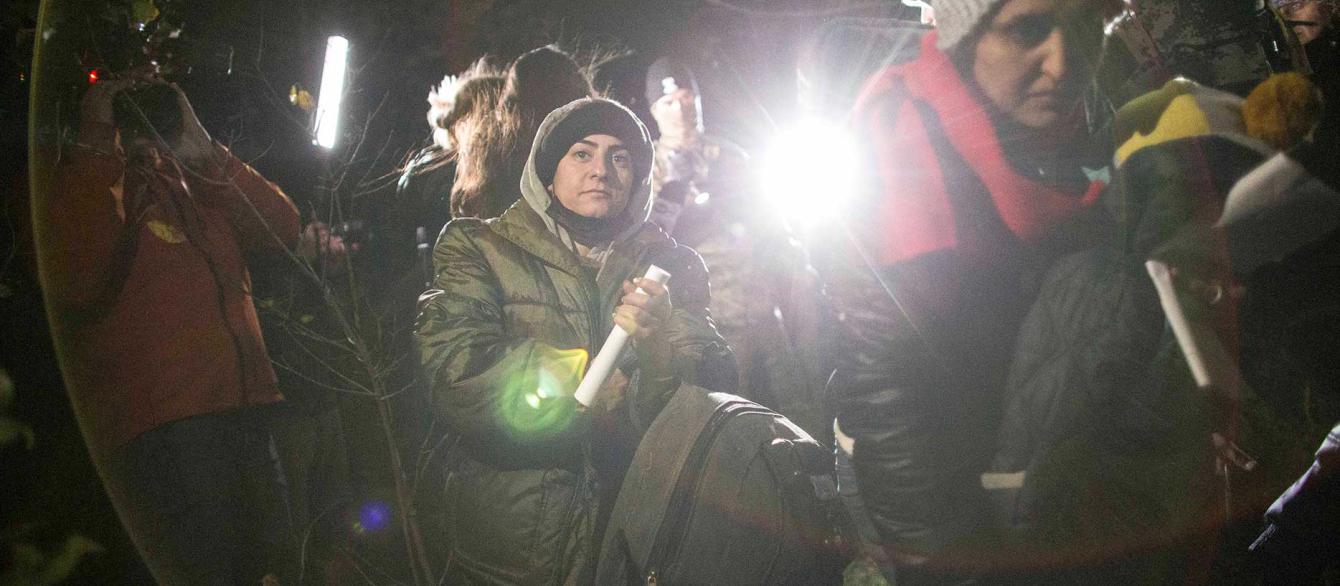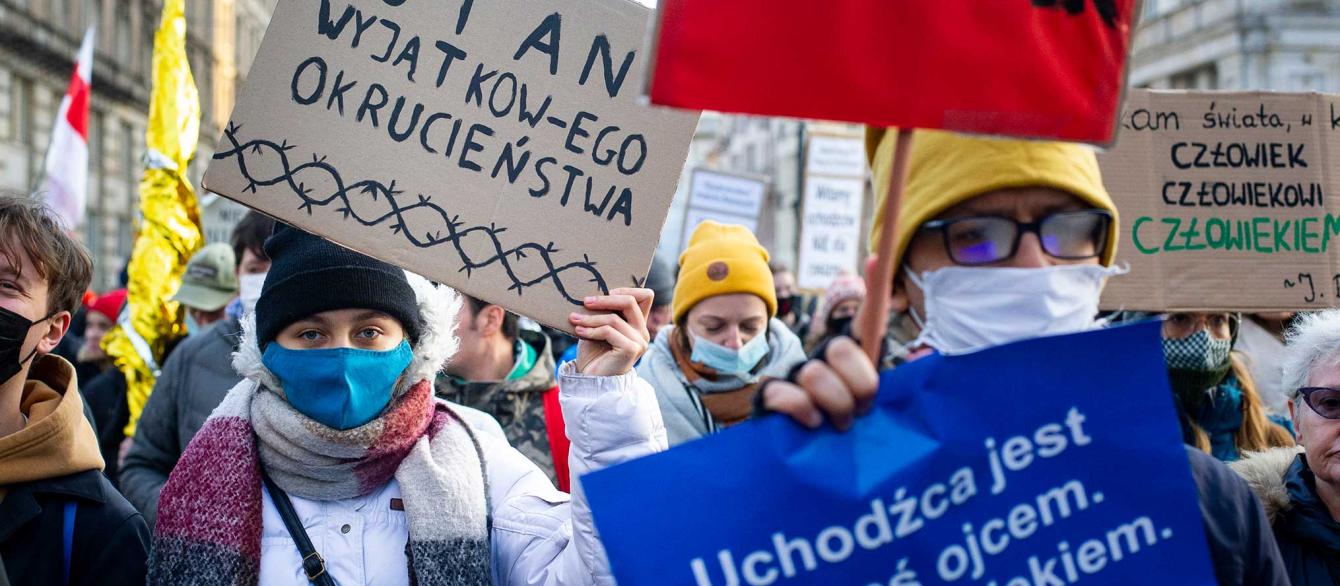Poland’s border with Belarus has in the post-communist era been a sleepy zone with little activity to write home about. In 2020, the Polish border guard detained 122 migrants crossing the border illegally; in November of 2021, they recorded twice that number in a single day. The cause? Massive numbers of migrants from the Middle East being shuffled westward––over the eastern border of the European Union––by embattled Belarussian leader Aleksander Lukashenko.
The move has been decried by MEPs and EU allies as an effort to destabilize the Union, and a successful one at that, but its destructive impact on domestic Polish politics has received comparatively little attention from international media. The deluge of migrants has intensified the Law and Justice (PiS) regime’s assault on the rule of law and on free media while simultaneously illuminating the precarious position of Catholic Church.
In response to the migration, the government in September invoked a state of emergency for the first time since the advent of the Third Polish Republic in 1989. The provision allowed the regime to restrict the movement of non-resident civilians along the border zone, including humanitarian NGOs, reporters, medics and charity arms of the Catholic Church. Outcry from these parties was swift and loud. They pleaded with the government to provide aid to the displaced or to let private organizations step in and do so.
Yet although the European Court of Human Rights agreed that Poland was required to provide migrants with food, medicine and shelter, Polish authorities continued to prevent volunteers and opposition MPs from communicating with or helping refugees. Journalists complained that they could not provide an unbiased picture of what was happening on the ground because lack of access to the area meant that state briefings were the only source of information.
In response, Poland’s Deputy Foreign Minister Piotr Wawrzyk pointed out that “Nothing prevents your editor or any other journalist from going to Belarus and reporting from there. If you are not satisfied with the fact that the border has been closed or if you believe that you are limited in your activities, then you can report from the other side.”

A group of migrants surrounded by journalists and border guard after crossing the Polish-Belarusian border near Michalowo on October 6, 2021.
To any observer of the region, this is a horrifying admission: that Belarus––the notorious “last dictatorship in Europe”––is more supportive of free media than an 18-year EU member-state. Whether meant in earnest or simply as a proverbial screw-you to the media, Wawrzyk’s tone and message here indicate the PiS regime’s intent to antagonize journalists rather than protect them and their work, even when such work would be to the state’s benefit.
As journalist Wojciech Bojanowski pointed out in response to a Russian news report that Polish authorities were tear gassing children and beating migrants, “the ban on Polish and international media at the border means that [these claims] reach the world without verification.” Even so, in true authoritarian fashion, PiS appears to view the media as more of a threat than an ally.
The initial state of emergency was to last 30 days, and it was extended for an additional 60 days at the end of September. This cumulative total of 90 days is the longest a state of emergency can last under Polish law, the post-communist constitution having been drafted with the memory of the 1981 imposition of martial law still fresh in the framers’ minds. When it elapsed at the start of December, however, PiS lawmakers chose to “bypass the constitution” to effectively reinstate the state of emergency on the eastern border through a set of equally restrictive measures.
Though journalists were finally allowed entry to the border zone, it would only be with possession of a Border Guard–issued permit and only in groups. These rules also apply to representatives of humanitarian organizations. Poland’s Senate Legislative Office and the Commissioner for Human Rights have both decried the law as unconstitutional, but it is nevertheless set to remain on the books until March 2022.
Importantly, it is not only opposition party members, journalists, and that pesky European Court of Human Rights that have taken issue with the government’s handling of the border crisis. Even major PiS allies have suffered the consequences of the draconian state of emergency; most notably, the situation has exposed fissures in the already-floundering Polish Catholic Church.
Although close to 92 percent of Poles still identify themselves as Catholic in recent polling, a growing number report a negative view of the church. An institution that has faced lessening support in recent years as news of its collusion with the communist secret police, its corrupt property reprivatization scheme, and its coverup of child sex abuse came to the fore, the church has actively sought to project internal cohesion to keep itself afloat.
And yet, the response of the Episcopate to the crisis on the border has clashed with the public perspectives of many priests, exposing gaps between what the institution wants and what its individual priests believe. Head of the Episcopate Archbishop Stanisław Gądecki echoes the “love thy neighbor” rhetoric of Pope Francis, advocating that the church provide “spiritual and material support” to the refugees, but a significant number of priests with national recognition (in the form of semi-popular Twitter accounts) disagree. Those keyboard warriors suggest instead that the migrants should be converted to Catholicism as a condition of church aid or that the church’s resources should be prioritized for soldiers and border guards rather than refugees.
While Gądecki’s call to action represents a rare disagreement between church leadership and PiS––the latter owing much of its electoral success to the support of Father Tadeusz Rydzyk’s Catholic media conglomerate, Radio Maryja––these priests demonstrate that the Catholic love affair with the ruling party is alive and well, even if figureheads like Gądecki might occasionally cry foul.
Professor Stanisław Obierk, a former priest himself, explains the discrepancy thus: “Priests repeat what most Polish Catholics think. They are also succumbing to the PiS rhetoric fueling fear. They do well in it—Polish Catholicism is supposed to defend the national identity.” Since they are not bound by political correctness in the way that Gądecki is, the Twitter-famous priests are free to fear-monger their followers into perpetuating the notion that Catholicism is intrinsically linked to Polishness, and thus any threat to Catholic hegemony––perhaps introduced by a horde of Muslim refugees on the border––is a threat to Polish national identity.
Maybe this perceived enemy is what the Polish church needs to regain its former popularity, or maybe the internal divisions that it revealed will push it further into a tailspin. Whatever the result, one thing is clear: anyone who cares about the rule of law, free media, or the future of religion in regional politics would be wise to watch this space.






